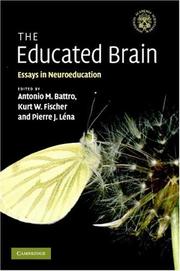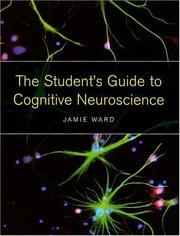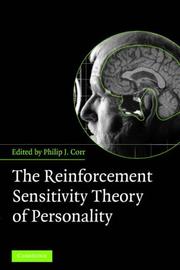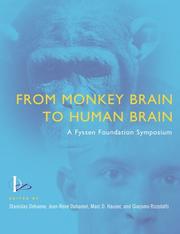| Listing 1 - 10 of 12 | << page >> |
Sort by
|
Book
ISBN: 0444875573 9786611790776 128179077X 008086676X 9780080866765 9780444875570 Year: 1984 Publisher: Amsterdam ; New York : New York, N.Y., U.S.A. : North-Holland ; Sole distributors for the U.S.A. and Canada, Elsevier Science Pub. Co.,
Abstract | Keywords | Export | Availability | Bookmark
 Loading...
Loading...Choose an application
- Reference Manager
- EndNote
- RefWorks (Direct export to RefWorks)
European Conference on Eye Movements (2nd : 1983 : Nottingham, England)
Eye --- Eye Movements --- 159.91 --- 159.91 Psychofysiologie. Neuropsychologie. Psychomotoriek. Psychomotorische therapie --- Psychofysiologie. Neuropsychologie. Psychomotoriek. Psychomotorische therapie --- Eye Movement --- Movement, Eye --- Movements, Eye --- Eye Movement Measurements --- Eyeball --- Eyes --- Visual system --- Face --- Photoreceptors --- Vision --- Movements&delete& --- Congresses --- Movements --- Research.
Book
Abstract | Keywords | Export | Availability | Bookmark
 Loading...
Loading...Choose an application
- Reference Manager
- EndNote
- RefWorks (Direct export to RefWorks)
1. De context 2. Schoon schip maken 3. Essentiêle informatie (basis) 4. Essentiële informatie (specifiek) 5. Leren door begeleide experimenten 6. Hulpmiddelen en belemmeringen 7. Het ontdekken van de kaart
Alexandertechniek. --- Spieren. --- Physiotherapy. Alternative treatments --- coördinatie --- evenwicht --- kinesitherapie --- evenwichtsleer --- 159.91 --- Alexandertechniek --- bewegen --- psychologie --- 415.2 --- Bewegingsapparaat --- Spieren --- Ergonomie --- Neurologie --- Fysiologie --- 61 --- Ademhaling --- Bewegen --- Denken --- Houding --- Lichaam --- Lichaamsbeeld --- Oefeningen --- Evenwicht --- Sportfysiologie --- 711 --- 159.91 Psychofysiologie. Neuropsychologie. Psychomotoriek. Psychomotorische therapie --- Psychofysiologie. Neuropsychologie. Psychomotoriek. Psychomotorische therapie --- gezicht, gehoor, smaak, reuk, gevoel en lichaamstaal --- Appareil locomoteur --- Muscles --- Physiologie --- Bewegingsleer --- Bewegingstherapie --- Bewegingsleer (fysiologie) --- Lichaamsbeweging --- Motoriek
Book
ISBN: 0826109233 9780826109231 9780826109224 0826109225 9780826127235 9780826127242 9780826127228 Year: 2014 Publisher: New York, New York : Springer Publishing Company,
Abstract | Keywords | Export | Availability | Bookmark
 Loading...
Loading...Choose an application
- Reference Manager
- EndNote
- RefWorks (Direct export to RefWorks)
Written for graduate students and trainees in mental health, this is the only text to present neurobiology in the context of clinical issues rather than merely focusing on experimental approaches to biological psychology or structuring it along neurological systems. In clear, easily accessible language the text explains how the brain and nervous system are linked to mental disorders. It integrates information from many aspects of neurobiological research, including imaging, neuropsychology, and genetics in order to foster an in-depth understanding of the psychiatric presentation of disorders t
Neurobiology. --- Psychobiology. --- Biological psychiatry. --- Biopsychiatry --- Psychiatry --- Psychobiology --- Biological psychology --- Biopsychology --- Biology --- Human behavior --- Psychology --- Biological psychiatry --- Neurosciences --- Neurobiology --- 159.91 --- 159.929 --- 159.929 Biopsychologie. Vergelijkende psychologie tussen mens en dier. --- Biopsychologie. Vergelijkende psychologie tussen mens en dier. --- 159.91 Psychofysiologie. Neuropsychologie. Psychomotoriek. Psychomotorische therapie --- Psychofysiologie. Neuropsychologie. Psychomotoriek. Psychomotorische therapie --- Biopsychologie. Vergelijkende psychologie tussen mens en dier

ISBN: 9780511489907 9780521876735 9780521181891 0511489900 9780511388750 0511388756 0511387741 9780511387746 0511386753 9780511386756 0521876737 1107182743 1281254738 9786611254735 0511384920 051138307X 0521181895 Year: 2008 Publisher: Cambridge, UK ; New York : Cambridge University Press,
Abstract | Keywords | Export | Availability | Bookmark
 Loading...
Loading...Choose an application
- Reference Manager
- EndNote
- RefWorks (Direct export to RefWorks)
The emerging field of neuroeducation, concerned with the interaction between mind, brain and education, has proved revolutionary in educational research, introducing concepts, methods, and technologies into many advanced institutions around the world. The Educated Brain presents a broad overview of the major topics in this new discipline: Part I examines the historical and epistemological issues related to the mind/brain problem and the scope of neuroeducation; Part II provides a view of basic brain research in education and use of imaging techniques, and the study of brain and cognitive development; and Part III is dedicated to the neural foundations of language and reading in different cultures, and the acquisition of basic mathematical concepts. With contributions from leading researchers in the field, this book features the most recent and advanced research in cognitive neurosciences.
Educational psychology --- Learning --- 159.91 --- 159.9:37 --- 159.95*1 --- Neuropsychology --- Education --- Psychology --- 159.95*1 Cognitieve psychologie --- Cognitieve psychologie --- 159.9:37 Psychologie in verband met opvoedkunde --- Psychologie in verband met opvoedkunde --- 159.91 Psychofysiologie. Neuropsychologie. Psychomotoriek. Psychomotorische therapie --- Psychofysiologie. Neuropsychologie. Psychomotoriek. Psychomotorische therapie --- Physiological aspects --- Educational psychology. --- Physiological aspects. --- Health Sciences --- Psychiatry & Psychology

ISBN: 1841695351 9781841695358 1841695343 9781841695341 Year: 2006 Publisher: Hove Psychology Press
Abstract | Keywords | Export | Availability | Bookmark
 Loading...
Loading...Choose an application
- Reference Manager
- EndNote
- RefWorks (Direct export to RefWorks)
03
Cognitive neuroscience --- Cognitive psychology --- Physiology of nerves and sense organs --- #KVHB:Cognitieve psychologie --- #KVHB:Neurologie --- #KVHB:Neuropsychologie --- 159.9 --- cognitieve psychologie --- neurologie --- psychologie --- 159.91 --- Cognitive Science. --- Cognitive Sciences --- Science, Cognitive --- Sciences, Cognitive --- Cognitive neuropsychology --- Cognitive science --- Neuropsychology --- 159.91 Psychofysiologie. Neuropsychologie. Psychomotoriek. Psychomotorische therapie --- Psychofysiologie. Neuropsychologie. Psychomotoriek. Psychomotorische therapie --- Neurociencias cognitivas. --- Neurociencias. --- Procesos cognitivos --- Aspectos fisiológicos. --- Gedragstherapie --- Neurologie --- Neuropsychologie --- Wetenschappelijk onderzoek --- Cognitive Science --- Natuurwetenschappen --- Verpleegkunde --- Onderzoek (wetenschap)
Book
ISBN: 1283953188 0262312042 0262018527 0262312050 9780262312042 9780262312035 0262312034 9781283953184 9780262018524 9780262312059 Year: 2013 Publisher: Cambridge, Mass. : MIT Press,
Abstract | Keywords | Export | Availability | Bookmark
 Loading...
Loading...Choose an application
- Reference Manager
- EndNote
- RefWorks (Direct export to RefWorks)
Cognitive neuroscientists increasingly claim that brain images generated by new brain imaging technologies reflect, correlate, or represent cognitive processes. This book warns against these claims, arguing that, despite its utility in anatomic and physiological applications, brain imaging research has not provided consistent evidence for correlation with cognition. It bases this argument on a review of the empirical literature, pointing to variability in data not only among subjects within individual experiments but also in the meta-analytical approach that pools data from different experiments.
Cognitive neuroscience. --- Cognitive neuropsychology --- Cognitive science --- Neuropsychology --- Meta-analysis. --- Brain --- Brain mapping. --- Brain mapping --- Cognition --- Physiology. --- Physiology --- COGNITIVE SCIENCES/Psychology/Cognitive Psychology --- NEUROSCIENCE/General --- COGNITIVE SCIENCES/General --- Psychology --- Connectome mapping --- Mapping of the brain --- Topographic brain mapping --- Cerebrum --- Mind --- Central nervous system --- Head --- Medicine --- Psychometrics --- Social sciences --- Localization of functions --- Research --- Evaluation --- Statistical methods --- 159.91 --- 159.95*1 --- 159.95*1 Cognitieve psychologie --- Cognitieve psychologie --- 159.91 Psychofysiologie. Neuropsychologie. Psychomotoriek. Psychomotorische therapie --- Psychofysiologie. Neuropsychologie. Psychomotoriek. Psychomotorische therapie

ISBN: 9780521617369 9780521851794 9780511819384 9780511388644 0511388640 0511819382 0511387652 9780511387654 0511384815 9780511384813 9780511386640 0511386648 1281254444 9781281254443 0521851793 0521617367 0521851793 1107176123 0511382987 9786611254445 Year: 2008 Publisher: New York ; Cambridge, UK : Cambridge University Press,
Abstract | Keywords | Export | Availability | Bookmark
 Loading...
Loading...Choose an application
- Reference Manager
- EndNote
- RefWorks (Direct export to RefWorks)
One of the major neuropsychological models of personality, developed by world-renowned psychologist Professor Jeffrey Gray, is based upon individual differences in reactions to punishing and rewarding stimuli. This biological theory of personality - now widely known as 'Reinforcement Sensitivity Theory' (RST) - has had a major influence on motivation, emotion and psychopathology research. In 2000, RST was substantially revised by Jeffrey Gray, together with Neil McNaughton, and this revised theory proposed three principal motivation/emotion systems: the 'Fight-Flight-Freeze System' (FFFS), the 'Behavioural Approach System' (BAS) and the 'Behavioural Inhibition System' (BIS). This is the first book to summarise the Reinforcement Sensitivity Theory of personality and bring together leading researchers in the field. It summarizes all of the pre-2000 RST research findings, explains and elaborates the implications of the 2000 theory for personality psychology and lays out the future research agenda for RST.
Personality development --- Reinforcement (Psychology) --- #SBIB:15G --- 159.91 --- 159.923 --- 159.92 --- Conditioned response --- Incentive (Psychology) --- Character development --- Character formation --- Development, Character --- Development, Personality --- Formation, Character --- Child psychology --- 159.92 Geestelijke ontwikkeling en vermogen. Ontwikkelingspsychologie --- Geestelijke ontwikkeling en vermogen. Ontwikkelingspsychologie --- 159.923 Persoonlijkheid. Identiteit --- Persoonlijkheid. Identiteit --- 159.91 Psychofysiologie. Neuropsychologie. Psychomotoriek. Psychomotorische therapie --- Psychofysiologie. Neuropsychologie. Psychomotoriek. Psychomotorische therapie --- Psychologie --- Personality development. --- Health Sciences --- Psychiatry & Psychology
Book
ISBN: 1443875902 9781443875905 1336096845 9781336096844 1443865192 9781443865197 Year: 2015 Publisher: Newcastle upon Tyne, England : Cambridge Scholars Publishing,
Abstract | Keywords | Export | Availability | Bookmark
 Loading...
Loading...Choose an application
- Reference Manager
- EndNote
- RefWorks (Direct export to RefWorks)
Sport psychological training, an important part of athletes' preparation, can give them the final edge in competition. This book provides a systematic structure for conducting sport psychological interventions that can be followed not only by sport psychologists, but also by athletes and coaches. The authors describe sport psychological measures that are based on scientific knowledge and have proven to be valuable in their applied work. The book is divided into two main parts. Part 1 presents the basic structure for sport psychological interventions and Part 2 focuses on concrete interventions and training measures. Part 1 further addresses the importance of personality factors for sports performance, illustrates how an athlete's personality development can be enhanced, gives basic knowledge about diagnostic tools, and discusses talent selection. The second part of the book describes basic training, which focuses mainly on relaxation techniques, as well as skills training, essential for the stabilisation of athletic performance. Maintaining a balanced recovery-stress state is particularly important for the avoidance of overtraining. The book illustrates how athletes' stress and recovery levels can be monitored in order to prevent overtraining. Part 2 further addresses how critical situations in an athlete's career (including, for example, conflicts, career termination, and injuries) are to be handled, presenting various impact interventions, including clinical hypnosis. The final chapter of the book presents a mental toolbox, giving the practitioner an overview that will help to quickly identify a problem, its possible causes, and solutions.
Athletes --- Sports persons --- Sportspeople --- Sportspersons --- Sports personnel --- Mental health. --- Mental health services. --- Counseling of. --- Psychotherapy --- Sports --- 159.9:796 --- 159.91 --- 159.91 Psychofysiologie. Neuropsychologie. Psychomotoriek. Psychomotorische therapie --- Psychofysiologie. Neuropsychologie. Psychomotoriek. Psychomotorische therapie --- 159.9:796 Psychologie van de sport. Sportpsychologie. Coachen. Mentale training --- Psychologie van de sport. Sportpsychologie. Coachen. Mentale training --- Motivation in sports --- Sport psychology --- Sports motivation --- Sports psychology --- Sports sciences --- Psychagogy --- Therapy (Psychotherapy) --- Mental illness --- Clinical sociology --- Mental health counseling --- Mental health --- Psychological aspects --- Treatment

ISBN: 0262042231 9786612097492 0262271419 1282097490 1423746805 9780262042239 9780262271417 9781423746805 Year: 2005 Publisher: Cambridge, Ma : MIT Press,
Abstract | Keywords | Export | Availability | Bookmark
 Loading...
Loading...Choose an application
- Reference Manager
- EndNote
- RefWorks (Direct export to RefWorks)
Leaders in cognitive psychology, comparative biology, and neuroscience discuss patterns of convergence and divergence seen in studies of human and nonhuman primate brains.The extraordinary overlap between human and chimpanzee genomes does not result in an equal overlap between human and chimpanzee thoughts, sensations, perceptions, and emotions; there are considerable similarities but also considerable differences between human and nonhuman primate brains. From Monkey Brain to Human Brain uses the latest findings in cognitive psychology, comparative biology, and neuroscience to look at the complex patterns of convergence and divergence in primate cortical organization and function.Several chapters examine the use of modern technologies to study primate brains, analyzing the potentials and the limitations of neuroimaging as well as genetic and computational approaches. These methods, which can be applied identically across different species of primates, help to highlight the paradox of nonlinear primate evolution--the fact that major changes in brain size and functional complexity resulted from small changes in the genome. Other chapters identify plausible analogs or homologs in nonhuman primates for such human cognitive functions as arithmetic, reading, theory of mind, and altruism; examine the role of parietofrontal circuits in the production and comprehension of actions; analyze the contributions of the prefrontal and cingulate cortices to cognitive control; and explore to what extent visual recognition and visual attention are related in humans and other primates.The Fyssen Foundation is dedicated to encouraging scientific inquiry into the cognitive mechanisms that underlie animal and human behavior and has long sponsored symposia on topics of central importance to the cognitive sciences.
Brain --- Comparative neurobiology --- Primates --- Cerveau --- Neurobiologie comparée --- Evolution --- Congresses --- Congresses. --- Physiology --- Congrès --- Physiologie --- Brain -- Evolution -- Congresses. --- Comparative neurobiology -- Congresses. --- Primates -- Physiology -- Congresses. --- Biological Processes --- Mammals --- Genetic Processes --- Central Nervous System --- Genetic Phenomena --- Biological Science Disciplines --- Vertebrates --- Nervous System --- Biological Phenomena --- Anatomy --- Phenomena and Processes --- Natural Science Disciplines --- Chordata --- Disciplines and Occupations --- Animals --- Eukaryota --- Organisms --- Physiology, Comparative --- Biological Evolution --- Human Anatomy & Physiology --- Health & Biological Sciences --- Neuroscience --- 159.91 --- Psychofysiologie. Neuropsychologie. Psychomotoriek. Psychomotorische therapie --- Conferences - Meetings --- 159.91 Psychofysiologie. Neuropsychologie. Psychomotoriek. Psychomotorische therapie --- Neurobiologie comparée --- Congrès --- Quadrumana --- Comparative neurology --- Cerebrum --- Mind --- Neurobiology --- Central nervous system --- Head --- NEUROSCIENCE/General
Book
ISBN: 0262015234 9786613119063 026229544X 1283119064 0262294605 9780262295444 9781283119061 9780262015233 9780262294607 6613119067 Year: 2011 Publisher: Cambridge, Mass. : MIT Press,
Abstract | Keywords | Export | Availability | Bookmark
 Loading...
Loading...Choose an application
- Reference Manager
- EndNote
- RefWorks (Direct export to RefWorks)
This volume offers contributions from leaders in the field of cerebral plasticity and looks at normal development and the influences of environmental manipulations, cerebral plasticity in adulthood and the underlying mechanisms of plasticity.
Cerebral cortex. --- Neuroplasticity. --- Neuroplasticity --- Cerebral cortex --- Nervous System Physiological Processes --- Cerebrum --- Biological Science Disciplines --- Nervous System Diseases --- Physiological Processes --- Natural Science Disciplines --- Nervous System Physiological Phenomena --- Diseases --- Physiological Phenomena --- Telencephalon --- Phenomena and Processes --- Disciplines and Occupations --- Musculoskeletal and Neural Physiological Phenomena --- Prosencephalon --- Brain --- Central Nervous System --- Nervous System --- Anatomy --- Physiology --- Neurodegenerative Diseases --- Growth and Development --- Neuronal Plasticity --- Cerebral Cortex --- Human Anatomy & Physiology --- Health & Biological Sciences --- Neuroscience --- Brain mantle --- Cortex, Cerebral --- Cortex cerebri --- Mantle of brain --- Pallium (Brain) --- Nervous system plasticity --- Neural adaptation --- Neural plasticity --- Neuronal adaptation --- Neuronal plasticity --- Plasticity, Nervous system --- Soft-wired nervous system --- Synaptic plasticity --- Adaptation (Physiology) --- Neurophysiology --- Developmental neurobiology --- NEUROSCIENCE/General --- 159.91 --- 159.91 Psychofysiologie. Neuropsychologie. Psychomotoriek. Psychomotorische therapie --- Psychofysiologie. Neuropsychologie. Psychomotoriek. Psychomotorische therapie
| Listing 1 - 10 of 12 | << page >> |
Sort by
|

 Search
Search Feedback
Feedback About UniCat
About UniCat  Help
Help News
News